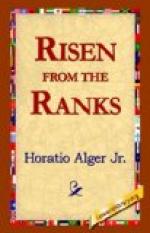“I am afraid that I can’t offer high pay for your services in that capacity,” said Mr. Anderson.
“I shall charge nothing, sir,” said Harry, “but thank you for the opportunity of entering, if only for a short time, a profession to which it is my ambition to belong.”
After a brief consultation with his wife, Mr. Anderson appointed Harry editor pro tem., and began to make arrangements for his journey. Harry’s weekly wages were raised to fifteen dollars, out of which he waa to pay Ferguson four dollars a week for board.
So our hero found himself, at nineteen, the editor of an old established paper, which, though published in a country village, was not without its share of influence in the county and State.
CHAPTER XXXII.
THE YOUNG EDITOR.
The next number of the Centreville “Gazette” contained the following notice from the pen of Mr. Anderson:—
“For the first time since our connection with the ‘Gazette,’ we purpose taking a brief respite from our duties. The state of our health renders a vacation desirable, and an opportune invitation from a brother at the West has been accepted. Our absence may extend to two or three months. In the interim we have committed the editorial management to Mr. Harry Walton, who has been connected with the paper, in a different capacity, for nearly three years. Though Mr. Walton is a very young man, he has already acquired a reputation, as contributor to papers of high standing in Boston, and we feel assured that our subscribers will have no reason to complain of the temporary change in the editorship.”
“The old man has given you quite a handsome notice, Harry,” said Ferguson.
“I hope I shall deserve it,” said Harry; “but I begin now to realize that I am young to assume such responsible duties. It would have seemed more appropriate for you to undertake them.”
“I can’t write well enough, Harry. I like to read, but I can’t produce. In regard to the business management I feel competent to advise.”
“I shall certainly be guided by your advice, Ferguson.”
As it may interest the reader, we will raise the curtain and show our young hero in the capacity of editor. The time is ten days after Mr. Anderson’s absence. Harry was accustomed to do his work as compositor in the forenoon and the early part of the afternoon. From three to five he occupied the editorial chair, read letters, wrote paragraphs, and saw visitors. He had just seated himself, when a man entered the office and looked about him inquisitively.
“I would like to see the editor,” he said.
“I am the editor,” said Harry, with dignity.
The visitor looked surprised.
“You are the youngest-looking editor I have met,” he said. “Have you filled the office long?”
“Not long,” said Harry. “Can I do anything for you?”




